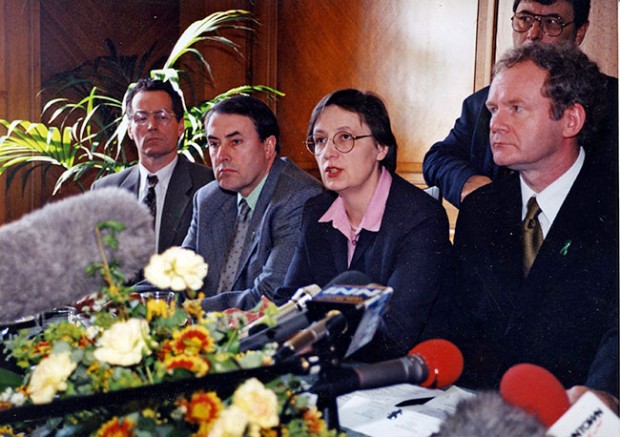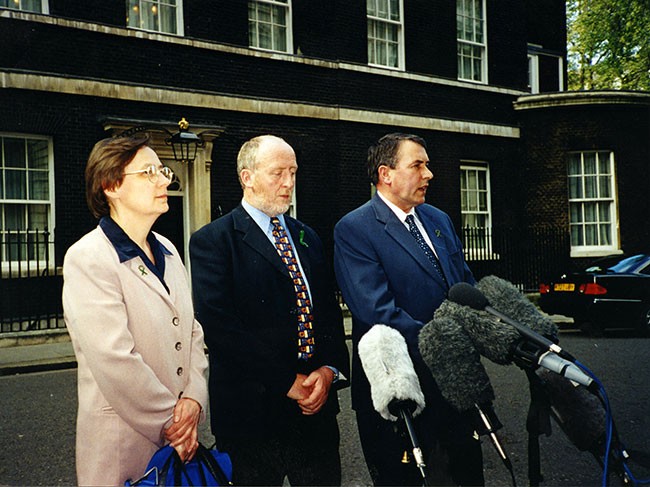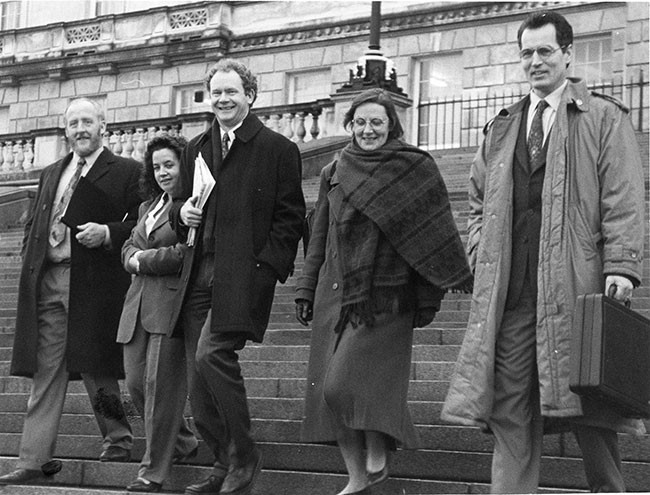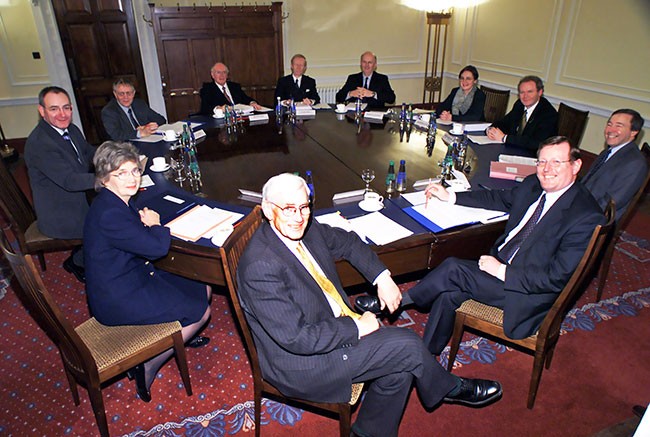23 February 2023 Edition
‘How did they let you take Health and Education?’

• Gerry Kelly, Mitchel McLaughlin, Bairbre de Brún and Martin McGuinness facing the press, April 1999 (Joe Reilly in background)
Bairbre de Brún and Martin McGuinness were the first two Sinn Féin ministers in the Assembly Executive. Here Bairbre tells of her journey from the classroom to ministerial office.
• • • • • • • • •
The period of the late 1990s was a whirlwind for me, going from being a local activist and member of the Sinn Fein Ard Chomhairle, who travelled abroad to promote the importance of the peace process, through the period of being a teacher in an Irish medium school who took a year out to join Martin McGuinness on the Business Committee of the negotiations, to joining Martin in the Executive that was set up after the Good Friday Agreement as the first Sinn Féin ministers in the Six Counties and, in my case, one of the first ever female ministers from any local party.
I still pinch myself when I think of sharing these experiences with Martin, Gerry, and other giants of that period of history.
This encompassed visits to South Africa and meeting with Nelson Mandela, as ANC members shared their experiences of negotiations with us, and here at home, seeing local democracy in action as community halls were packed with community activists pushing to include their needs and their demands on the negotiation’s agenda, and women marched to secure women’s place in what came out of the negotiations.
It brought the jolt of moving from a school which was lively, co-educational, Irish-speaking, and where the pupils called the teachers by their first name to a very formal, overwhelmingly male, and English-speaking atmosphere of negotiations at Stormont once Sinn Féin finally overcame our initial exclusion.
It included moments of great hope and pride. It also included real lows such as hearing about the Omagh bomb and the tragic loss of life that day. There is always the danger that naming one event can appear to diminish others, but that was not the case. We were always aware throughout that period of the real suffering people were going through and the determination to lead everyone to a better place.

• Bairbre, Seán MacManus and Mitchel McLaughlin after a meeting in Downing Street
My memories of that time include the people who opened their homes to us so that we could discuss negotiating strategy with some measure of privacy and the painstaking work of preparing and refining papers and positions for our main negotiators on the whole range of issues that eventually became the Good Friday Agreement.
I have fond and proud memories of meeting and working with those in our communities who had expertise on that range of issues to tease out with them the possibilities and limitations of what we could hope to achieve.
I expect that becoming a minister is daunting even for a career politician who has had other ministers in their party or family before, and a parliament if not a government stretching back continuously for years. It was even more daunting without any of those.
Sinn Féin had announced months earlier who our ministers would be, but we had to wait for the evening of nominations to find out what portfolio we would get. This was decided by a formula called d’Hondt which allowed parties to choose according to size while also ensuring fair distribution of positions.
Martin McGuinness was nominated as Minister of Education, and I was second last in line to choose. The Health Service had huge challenges in its inbox and was still available. That was my choice. I knew I was ready. I was confident I could do it with help, but I was still almost overwhelmed by a sense of responsibility as well as opportunity.

• Early Talks, January 1995: Sinn Féin delegation after talks with British government representatives in Stormont, Seán MacManus, Siobhán O'Hanlon, Martin McGuinness, Bairbre de Brún and Gerry Kelly
Like all parties, Sinn Féin had spent the previous months looking at what our priorities might be for any department we might take. The big picture items were all over the media and easy to spot, but we had had some briefing months previously where I had been struck by the question of public health and the things in wider society that can add to good health or ill health. That had struck a chord with me.
In the corridor later, I bumped into a British civil servant who had been heavily involved in the negotiations leading to the Good Friday Agreement. “How did they let you take Health and Education?” he asked. That was a good question. Health and Education were key portfolios for anyone who wanted to improve life for the most vulnerable and for those less well off. We were going to make the most of those opportunities and to try and deliver for everyone across the board.
I got a lot of mail congratulating me on becoming Minister but one line in one letter always sticks in my mind. A former permanent secretary, the late Maurice Hayes, urged me to remember that I was “Minister for Health, not Minister for Sickness”. That resonated with me and with our approach that dealing with the social determinants of health was vital. This wasn’t just about treating people once they were ill, it was about trying to prevent people from becoming ill and dealing with factors that led to huge inequalities in health in the population.

• FIrst Executive meeting (clockwise from front) SDLP's Seamus Mallon, Brid Rodgers, Mark Durkan and Seán Farren. Ulster Unionist's Sam Foster, Reg Empey and Michael McGimpsey. Sinn Féin's Bairbre de Brún and Martin McGuinness. John Semple (Civil Service Office) and Ulster Unionist, David Trimble. Missing are Nigel Dodds and Peter Robinson of the DUP, who refused to sit with Sinn Féin
In my first Ministerial visit to the Royal Victoria Hospital, a major Regional Hospital in Belfast, auxiliary nursing and cleaning staff were coming off shift as I arrived and all saying ‘hello Bairbre’ on the way past. I could hear officials behind me commenting on this. Although that might not be so unusual an occurrence in Dublin, after years of direct rule from London in the North they clearly weren’t used to people here knowing their Minister.
Months afterwards, a civil servant confided to me that not only had they spent most of their formative years as a civil servant under direct rule ministers, most of that time had also been under British Conservative ministers, so the experience of a local Executive and the ideas we brought to that was a totally new departure for them.
A few short weeks after taking office we were faced with the first budget settlement and had to decide on the allocations within our Department to the various priorities. My emphatic ‘No’ to a suggested cut to a programme for children in disadvantaged areas was reflected not only in that paper, but automatically referred to in every draft paper after that.
The Executive took office at the start of December and that winter saw the worst winter pressures in years which I needed to address as Minister for Health, Social Services and Public Safety.
It was an enormous privilege as Minister to see how frontline workers across those services dealt with the pressures and a privilege to meet with them and with families caring for loved ones. They were and are the salt of the earth. I often think of that now when I see what frontline workers have had to do during the pandemic. And what they are trying to cope with now.
• Bairbre de Brún is a former Sinn Féin MEP, Assembly minister, MLA and party councillor.



